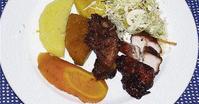Kirk Bolton, Contributor
Next time you eat, take a long look at your plate and compare the quantity of food from animal against the staples group. Do the staples represent about 50-60 per cent of your meal? Does the food from animals represent at least 20 per cent of the food that you have in your plate? - Photo by Shelly-Ann Thompson
"Most figure that they can just come here and work out and eat whatever. It does not work like that. Everybody has to follow a nutrition programme of higher protein and lower carbohydrates. People do not eat enough protein. Nutrition is the biggest part of weight training."
I refer to the above quote taken from the Outlook of March 25. This article involved an interview with a personal trainer of the Spartan Health Club. The above is taken from that article quoting this personal trainer. He was correct in stating that everybody needs to follow a nutrition programme. However, not everyone needs higher protein and lower carbohydrates.
Richest source
Your richest source of carbohydrate is found in the staple groups. This includes all plant-based foods that are not vegetables, legumes or fruits. Therefore, your richest carbohydrate source is your staple group which comprises foods such as rice, flour, yam, banana, potato, etc. Your richest source of protein is from your food from animals. Plant protein is less digested than animal protein, partly because it is encased in carbohydrate cell walls and is available to digestive enzymes. Some plants also contain enzymes that interfere with protein digestion, so the enzymes must be heat inactivated before consumption. This means that these plants have to be cooked before eating. An example of a plant that has to be cooked in order to make the protein digestible is soybeans.
Do we really need to consume more proteins and lower carbohydrates?
According to recommendations, a healthy adult requires 0.8 g protein for every kilogramme of body weight. This means that if someone is 81.8 kg (180 lb), that person would require at least 65.5 g of protein daily. To achieve this quantity of protein, humans benefit when dietary protein makes up approximately 15-20 per cent of total energy intake.
Protein requirement increases during times of stress and illnesses. Stress could be in the form of even the lifting of weights; in that case, protein increase is required. When one is ill, his/her immunity is compromised and, as such, an increase in protein facilitates an increase in the production of antibodies that would fight off bacteria and strengthen immunity.
Are we taking in too little proteins? In our region, we tend to consume more foods from the animal group, which indicates that we consume much more than 15-20 per cent of the protein required as daily energy intake. The quote above which states that we need to consume more proteins is inaccurate. The body doesn't store proteins, instead it is able to break down excess protein to form nitrogenous waste. So taking in more proteins than required doesn't present any long-term benefits.
Build greater mass
If one is trying to build greater mass, then it is understandable for increase in protein. However, this increase still requires regulation as the diet that is high in proteins would put extra work on the kidneys to rid the body of the increase nitrogenous waste. This waste later forms urine. One would notice that one tends to urinate more frequently. The requirement for water would also increase in an attempt by the body to get rid of this waste. This extra work on the kidneys over time may result in kidney problems.
It is incorrect to indicate to persons need to take in more proteins over carbohydrates. Sixty per cent of your energy intake should be coming from carbohydrates.
Persons who are trying to lose weight may experience weight loss; however, this is only water weight loss as a result of the increased urination due to the high levels of protein in the diet. This is not necessarily fat loss when a fat analysis or skin fold test is done. Persons who are on a protein diet may also experience an electrolyte imbalance. The electrolytes are, for example, salts of sodium, potassium or magnesium and some complex organic molecules.
Next time, take a real long look at your plate and compare the quantity of food from animal against the staples group. Do the staples represent about 50-60 per cent of your meal at that time? Does the food from animals represent at least 20 per cent of the food that you have in your plate?
Yes, nutrition plays an integral part of weight training. However, ensure that the information that you ascribe to is valid. Eat your food, practise moderation, and know also that your best supplement is food. Your body recognises this as natural.
- Kirk Bolton is the public relations officer of the Jamaica Association of Professionals in Nutrition & Dietetics.

